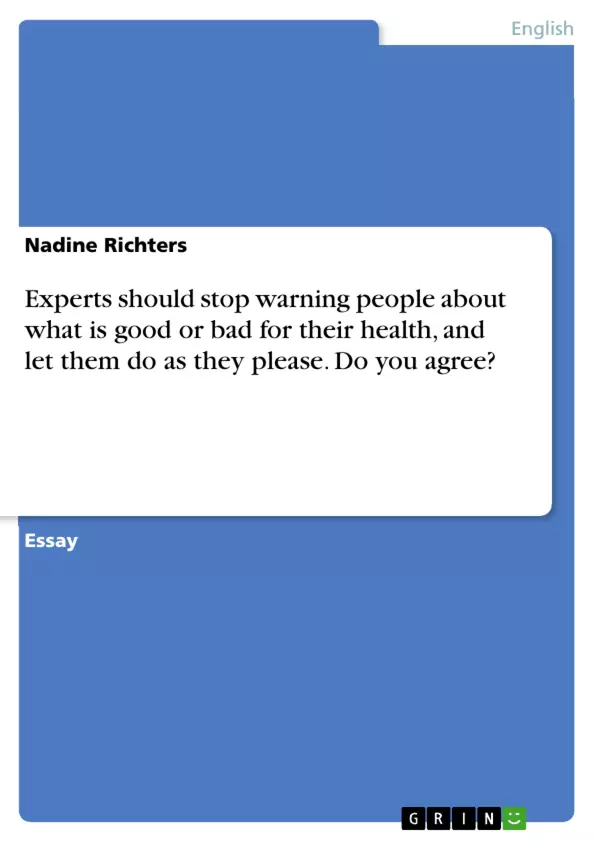Within the last few decades, the media have increasingly reported on health threats and ways of dealing with them. On the one hand this information on medical prophylaxis might be useful, in particular if the positive medical effects of these measures are investigated and verified, but on the other hand there are unfortunately many canards, for instance, the mobile phone issue and then some aspects affecting dental care.
Inhaltsverzeichnis (Table of Contents)
- Experts should stop warning people about what is good or bad for their health, and let them do as they please. Do you agree?
Zielsetzung und Themenschwerpunkte (Objectives and Key Themes)
This essay argues against the idea that medical experts should refrain from providing health advice. The author explores the potential harm that can arise from the over-reliance on expert pronouncements, but ultimately contends that experts should continue to provide guidance and warnings, even if these are not always universally effective.
- The role of media in disseminating health information
- The limitations of scientific evidence in health advice
- The potential for health advice to cause anxiety and hypochondria
- The importance of individual responsibility for health choices
- The dangers of exaggerating health risks
Zusammenfassung der Kapitel (Chapter Summaries)
The essay begins by discussing the growing trend of media reports on health threats and preventative measures. The author acknowledges the potential benefits of such information but highlights the prevalence of misinformation and exaggeration. The author then examines several specific examples, including the debate over mobile phone radiation and the effectiveness of exercise, healthy eating, and dental care. Through these examples, the author argues that experts frequently overstate the risks associated with certain behaviors and that their advice is not always grounded in conclusive evidence. The author also expresses concern about the potential for health advice to create unnecessary anxiety and fear, particularly among individuals susceptible to hypochondria. Ultimately, the author concludes that while expert advice can be valuable, it should not be taken as definitive or unquestionable. Individuals should take responsibility for their own health choices, carefully evaluating the evidence and making informed decisions.
Schlüsselwörter (Keywords)
This essay focuses on the role of medical experts in providing health advice, the limitations of scientific evidence, and the potential dangers of over-reliance on expert pronouncements. Key themes include media influence on health perceptions, the effectiveness of preventative measures, and the importance of individual responsibility for health choices. The essay also explores the potential for health advice to create anxiety and hypochondria.
Frequently Asked Questions
Should medical experts stop giving health advice?
The essay argues that despite limitations, experts should continue to provide guidance, although individuals must take responsibility for evaluating this advice.
What are the risks of over-relying on expert health warnings?
Over-reliance can lead to unnecessary anxiety, hypochondria, and fear, especially when risks are exaggerated or not based on conclusive evidence.
How does the media influence health perceptions?
Media reports often disseminate misinformation or "canards," such as exaggerated threats regarding mobile phone radiation or dental care, affecting public behavior.
Why is individual responsibility important in health choices?
Because scientific evidence can be limited or overstated, individuals should make informed decisions by carefully evaluating available medical information.
What examples are used to illustrate the limitations of health advice?
The author discusses the mobile phone radiation issue, the effectiveness of specific exercises, healthy eating trends, and aspects of dental care.
Does health information always have a positive medical effect?
While medical prophylaxis can be useful if verified, much information is unfortunately based on unverified claims or media sensationalism.
- Quote paper
- Nadine Richters (Author), 2008, Experts should stop warning people about what is good or bad for their health, and let them do as they please. Do you agree?, Munich, GRIN Verlag, https://www.grin.com/document/113327



